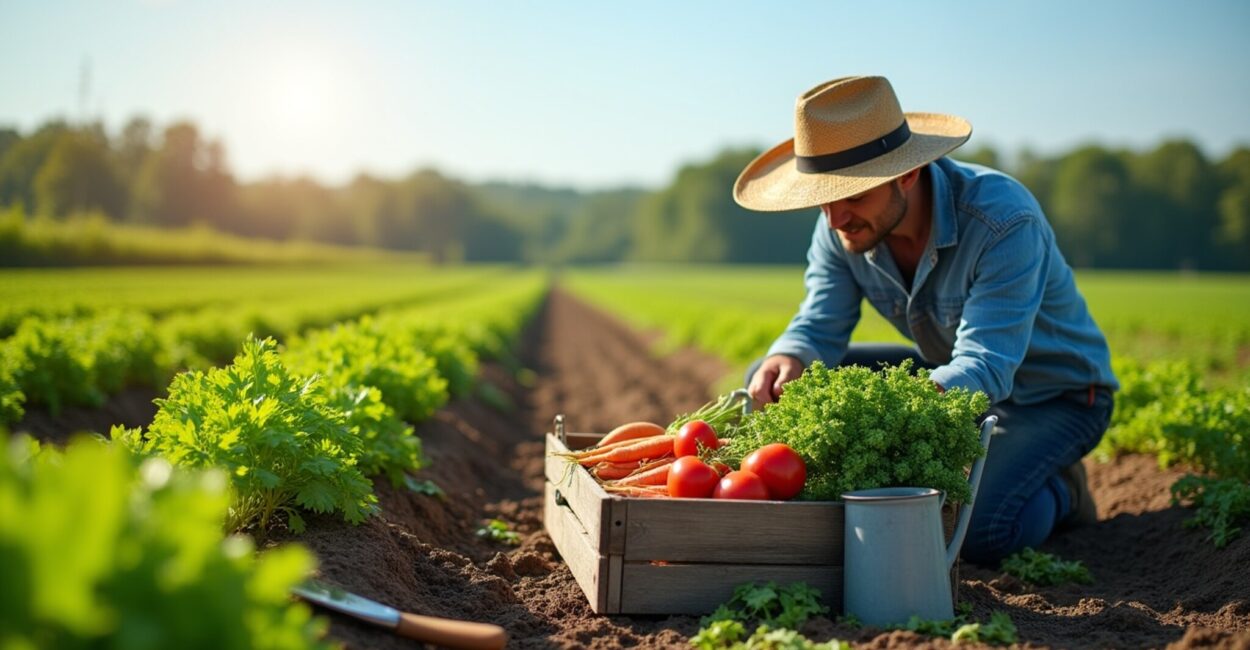Warning: Cannot modify header information - headers already sent in /home/u278635817/domains/mymorninglife.com/public_html/wp-content/plugins/artigosgpt/artigosgpt.php on line 29509
Warning: Cannot modify header information - headers already sent in /home/u278635817/domains/mymorninglife.com/public_html/wp-content/plugins/artigosgpt/artigosgpt.php on line 29509
Imagine a world where the food you eat nurtures not just your body, but the earth beneath your feet. Organic farming is more than a method of cultivation; it’s a movement towards healthier living and a thriving environment, especially in the quiet, simple rhythms of country life. Understanding how organic farming supports health and the environment unlocks a vital connection between sustainable practices and our well-being.
In today’s fast-paced world, the demand for organic farming has surged, driven by growing awareness of the harmful impacts of conventional agriculture. From soil preservation to chemical-free produce, organic farming is reshaping rural landscapes and lifestyles, offering a fresh blueprint for sustainable living in country contexts.
This article will explore the multifaceted benefits of organic farming, revealing how it enhances health, nurtures biodiversity, and revitalizes rural communities. Dive in to discover practical insights and inspiring facts that will change the way you view farming and food.
Contents
ToggleWhat Is Organic Farming and Why It Matters
Defining Organic Farming
Organic farming avoids synthetic chemicals, GMOs, and harmful pesticides. It emphasizes natural processes like crop rotation and composting to maintain soil health.
This approach prioritizes ecological balance, ensuring food is grown in harmony with nature, which is essential for long-term sustainability.
Importance for Rural Health and Environment
Organic farming reduces exposure to toxins for farmers and consumers. It promotes cleaner air, water, and soil by eliminating synthetic inputs common in conventional farming.
In country living, this means healthier families and ecosystems, with fewer contaminants threatening local wildlife and human health.
Global Trends and Local Impact
Worldwide, organic farming is expanding rapidly, reflecting consumer demand for healthier, environmentally friendly food. This trend revitalizes rural economies and preserves traditional agricultural knowledge.
Farmers adopting organic practices experience improved soil fertility, increased biodiversity, and often better financial stability.
Health Benefits of Organic Farming for Country Living
Nutritious, Chemical-Free Produce
Organic crops typically contain higher levels of antioxidants and essential nutrients. They are free from synthetic fertilizers and pesticides, reducing harmful residues.
Eating organic supports the body’s defense system and lowers the risk of chronic diseases linked to chemical exposure.
Reduced Exposure to Harmful Substances
Farm workers and rural residents are less exposed to toxic chemicals when organic methods are used. This lowers incidences of respiratory issues and skin conditions.
Children in farming communities especially benefit from safer food and environment, fostering healthier development.
Support for Mental Well-being
Living and working on organic farms promote a closer connection to nature. This connection is linked to lower stress levels and improved mental health in rural populations.
Organic farming encourages mindful practices, reducing anxiety and fostering a sense of purpose and community.
Environmental Advantages of Organic Farming
Soil Health and Fertility
Organic farming enriches soil through natural compost, cover crops, and crop rotation, improving its structure and nutrient content.
Healthy soil supports robust plant growth and reduces erosion, ensuring long-term land productivity.
Water Conservation and Quality
By eliminating synthetic chemicals, organic farms prevent water pollution from runoff. They also promote water retention through organic matter, reducing irrigation needs.
Clean water sources are vital for rural communities and wildlife, highlighting organic farming’s role in ecosystem preservation.
Biodiversity Preservation
Organic farms foster habitats for beneficial insects, birds, and soil organisms. This biodiversity helps control pests naturally and maintains ecological balance.
Diverse species on farms contribute to resilience against climate change and agricultural pests.
Sustainable Practices That Define Organic Farming
Crop Rotation and Polyculture
Rotating crops prevents soil depletion and disrupts pest cycles. Polyculture, or growing multiple crops together, mimics natural ecosystems.
These practices reduce the need for chemical interventions and enhance soil fertility.
Composting and Natural Fertilizers
Organic farms rely on compost and animal manure to nourish plants. These natural fertilizers improve soil structure and microbial activity.
They replace synthetic fertilizers, reducing environmental pollution and enhancing nutrient cycling.
Pest and Weed Management
Instead of pesticides, organic farming uses biological control agents, manual weeding, and crop diversity to manage pests and weeds.
This approach protects beneficial species and minimizes chemical residues in food and soil.
How Organic Farming Supports Rural Economies
Job Creation and Local Markets
Organic farms often require more labor, creating jobs in rural areas. They stimulate local economies through farmers’ markets and direct sales.
This fosters community engagement and strengthens rural livelihoods.
Higher Value and Consumer Demand
Organic products usually command premium prices, increasing farmers’ income. Growing awareness drives steady consumer demand for organic food.
Farmers benefit financially while providing healthier options to local and global markets.
Preservation of Traditional Knowledge
Organic farming encourages the continuation of time-tested agricultural practices. This preserves cultural heritage and biodiversity unique to rural regions.
It empowers farmers to maintain control over seeds, crops, and farming methods.
Practical Steps to Start Organic Farming in Rural Areas
- Test your soil to understand its current health and nutrient content.
- Choose appropriate organic seeds and plan crop rotations.
- Implement composting systems to enrich the soil naturally.
- Adopt natural pest and weed control methods.
- Establish connections with local markets for organic produce.
- Continuously monitor and adapt practices based on farm performance.
Affordable Transition Strategies
Start small with container gardening or raised beds to minimize initial costs. Use local organic inputs and build community support.
Gradually scale up as soil health and expertise improve, ensuring a sustainable transition.
Community Engagement and Education
Work with local agricultural extension services and organic farming groups. Participate in workshops and share knowledge within the community.
This collaborative approach enhances success rates and spreads awareness.
Challenges and Solutions in Organic Farming
Managing Pests Without Chemicals
Pests can pose challenges, but integrated pest management and natural predators provide effective control.
Regular monitoring and biodiversity help maintain pest populations at manageable levels.
Maintaining Soil Fertility
Organic farmers must balance nutrient inputs carefully. Crop rotation and organic amendments prevent nutrient depletion.
Soil testing guides fertilization plans, ensuring crops receive adequate nutrition.
Market Access and Certification
Certification can be costly, but it builds consumer trust. Joining cooperatives or local networks can ease market entry.
Direct sales and community-supported agriculture (CSA) models increase profitability and consumer connection.
Future Outlook: Organic Farming in Country Living
Technological Innovations
New tools like precision farming and organic biopesticides are enhancing organic practices, making them more efficient and scalable.
Technology supports monitoring soil health and optimizing resource use.
Policy and Support Systems
Governments and NGOs increasingly back organic farming through subsidies, training, and certification assistance.
These policies empower rural farmers to adopt sustainable methods confidently.
Growing Consumer Awareness
Consumers value transparency and sustainability. This trend will continue driving demand for organic products from rural farms.
Farmers who embrace organic methods stand to benefit from loyal, health-conscious markets.
| Benefit | Organic Farming Practice | Impact on Health & Environment |
|---|---|---|
| Soil Health | Crop rotation, composting | Improves fertility, prevents erosion |
| Water Quality | Eliminating synthetic chemicals | Reduces pollution, conserves water |
| Biodiversity | Polyculture, habitat preservation | Supports beneficial species, pest control |
| Human Health | Chemical-free produce | Reduces toxin exposure, enhances nutrition |
| Economic | Local markets, premium pricing | Supports rural income, job creation |
Conclusion
Organic farming breathes new life into country living, weaving together health, environment, and community in a rich tapestry of sustainable practice. As we’ve discovered, its benefits stretch far beyond the farm gate, fostering wellbeing for people and the planet alike. Choosing organic farming is choosing a future where food nourishes not only our bodies but the earth we all depend on—unlocking a healthier, more vibrant rural life.
Frequently Asked Questions
What exactly differentiates organic farming from conventional farming?
Organic farming avoids synthetic chemicals, genetically modified organisms, and artificial fertilizers, focusing instead on natural soil enrichment, crop rotation, and biological pest control. Conventional farming often relies on chemical inputs to boost yields but can harm soil health and the environment over time. Organic methods aim for sustainability, promoting biodiversity and reducing health risks.
How does organic farming improve soil health?
Organic farming uses compost, cover crops, and crop rotation to enrich soil with natural nutrients and organic matter. This improves soil structure, water retention, and microbial activity, leading to healthier crops and reduced erosion. Maintaining soil vitality is key to long-term productive farming and environmental resilience.
Can organic farming be profitable for small rural farms?
Yes, organic farming can be financially rewarding, especially with growing consumer demand for organic products. Although labor-intensive, it often commands premium prices. Small farms benefit from local markets, direct sales, and community-supported agriculture, which help increase income and build customer loyalty.
What challenges do farmers face when transitioning to organic farming?
Farmers may encounter pest management difficulties, soil fertility balancing, and certification costs during transition. These challenges require careful planning, education, and sometimes financial support. However, with proper strategies and community resources, the transition can be successful and rewarding.
How does organic farming contribute to environmental sustainability?
Organic farming promotes biodiversity, conserves water, and prevents chemical pollution. By improving soil health and reducing synthetic inputs, it supports healthy ecosystems and combats climate change impacts. These sustainable practices protect natural resources for future generations.
For further reading, visit the Food and Agriculture Organization’s organic agriculture page and Rodale Institute’s insights on organic farming.
More Articles















Sponsored Content












